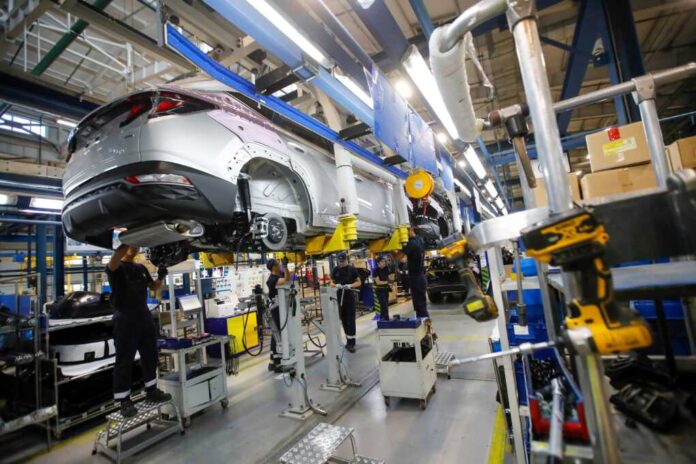
Hyundai’s new $7.6 billion Georgia factory will employ an army of Atlas humanoid robots to replace up to 40% of human workers by year’s end.
At a Glance
- Hyundai is deploying Boston Dynamics’ Atlas humanoid robots at its new $7.6 billion Metaplant America facility in Georgia to automate vehicle assembly
- The AI-powered, 5G-enabled factory aims to produce 500,000 vehicles annually and create 8,500 jobs by 2031
- Part of a massive $21 billion U.S. investment, the automation push comes as Hyundai faces potential tariffs on vehicles imported from South Korea
- The Atlas robots will perform physically demanding tasks previously done by humans, including lifting heavy components and installing vehicle doors
America’s Most Advanced Auto Factory Rises in Georgia
Hyundai Motor Group has officially opened its $7.6 billion Metaplant America facility in Georgia, establishing what may be the most technologically advanced automotive manufacturing plant in the United States. This massive facility represents the largest investment in Georgia’s history and will produce both electric and hybrid vehicles. Unlike traditional auto plants, Metaplant America incorporates cutting-edge automation technologies, including AI vision systems, autonomous mobile robots, and now, humanoid Atlas robots developed by Boston Dynamics, which Hyundai acquired from SoftBank in 2021.
The Georgia facility showcases Hyundai’s commitment to reshoring manufacturing operations with a distinctly American-focused production strategy. By 2031, the plant is projected to employ 8,500 full-time workers and achieve an annual production capacity of 500,000 vehicles. However, what truly sets this facility apart is its unprecedented level of automation. With private 5G technology from Georgia-based Future Technologies utilizing Nokia’s cellular infrastructure, the plant enables seamless connectivity for its army of robots and AI systems.
Hyundai unleashes Atlas robots in Georgia plant as part of $21B US automation push | Neetika Walter, Interesting Engineering
The automaker aims to manufacture 100,000 electric and hybrid vehicles annually at the new facility
Hyundai Motor Group is taking a bold step into the… pic.twitter.com/ZXELV4PtQL
— Owen Gregorian (@OwenGregorian) May 4, 2025
Robot Workforce: Atlas Takes on Manufacturing
The star of Hyundai’s automation strategy is the Atlas humanoid robot, which will be deployed at scale in the Georgia factory by year’s end. These sophisticated machines will tackle tasks traditionally performed by human workers, with Hyundai planning to automate up to 40% of vehicle assembly work. Atlas robots are specifically designed for physically demanding jobs like lifting heavy components and installing vehicle doors – tasks that pose ergonomic challenges and injury risks for human workers.
“HMGMA not only represents the group’s advanced manufacturing capabilities and commitment to innovation, but also our investment in relationships with our partners and communities right here in Georgia. With the rich history of craftsmanship and manufacturing in this community, together with the talented workforce at HMGMA we are building the future of mobility with America, in America.” – Euisun Chung
Following its acquisition of Boston Dynamics, Hyundai plans to purchase tens of thousands of robots to strengthen its position in mobile robotics. Beyond the humanoid Atlas, the company is already using the quadruped “Spot” robots for industrial inspections throughout its facilities. This robotics integration positions Hyundai at the forefront of manufacturing automation, potentially providing a competitive advantage as labor costs increase and skilled workers become harder to find.
America First Manufacturing Strategy
Hyundai’s massive automation investment comes amid rising trade tensions and increasing tariffs on imported vehicles. With North America being Hyundai’s largest market and U.S. sales rising by 4% last year despite global slowdowns, the company is vulnerable to tariffs on vehicles imported from South Korea. This economic reality has accelerated Hyundai’s push to manufacture more vehicles on American soil with American workers, supplemented by advanced robotics.
“Future Technologies has been headquartered out of Georgia for over 25 years. We appreciate the value that this investment by Hyundai Motor Group brings to the local market. We are very proud [of] our contribution to this project as the lead system integrator for the facility’s private 5G solution. Our skilled engineers and technicians designed and delivered the network, providing critical connectivity infrastructure to support industrial automation and autonomous mobile robots.” – Peter Cappiello
The comprehensive $21 billion U.S. investment includes not just the Georgia factory but also a $5.8 billion steel mill in Louisiana that will begin commercial production in 2029, supplying automotive steel plates directly to Hyundai’s American plants. Additionally, the company is considering expanding capacity at its existing Alabama plant. These investments create a vertically integrated manufacturing ecosystem on American soil, potentially insulating Hyundai from both supply chain disruptions and protective trade policies.
Economic Implications of Advanced Automation
While Hyundai promises 8,500 jobs by 2031, the high level of automation raises questions about the changing nature of manufacturing employment. The Atlas robots will replace what would traditionally be thousands of additional assembly line positions. However, these same robots create demand for highly skilled technicians, programmers, and maintenance specialists who can keep the automated systems running efficiently. This transformation reflects the broader economic shift toward higher-skilled technical positions in modern manufacturing.
“Hybrid vehicles with favorable cost performance have contributed significantly to Hyundai’s brand strength” – Lee Jae-il
Despite economic headwinds and inflationary pressures, Hyundai is betting big on the American market. According to company president Jose Munoz, Hyundai will hold off on price increases until at least June, despite concerns about potential consumer pushback in an increasingly price-sensitive market. This pricing strategy, combined with the efficiency gains from automation, may allow Hyundai to maintain competitive pricing while building vehicles in the U.S. with American workers and advanced robotics – a new model for sustainable domestic manufacturing in the age of AI and automation.
Sources:
https://www.rcrwireless.com/20250404/internet-of-things/hyundai-smarte-factory-ai-5g
https://interestingengineering.com/innovation/hyundai-to-deploy-humanoid-atlas-robots






















